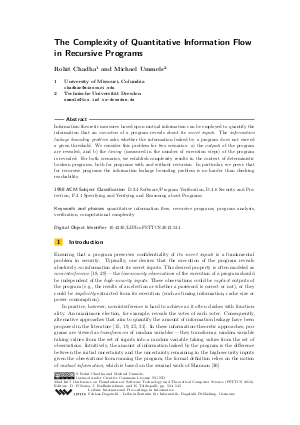The Complexity of Quantitative Information Flow in Recursive Programs
Authors Rohit Chadha, Michael Ummels
-
Part of:
Volume:
IARCS Annual Conference on Foundations of Software Technology and Theoretical Computer Science (FSTTCS 2012)
Part of: Series: Leibniz International Proceedings in Informatics (LIPIcs)
Part of: Conference: IARCS Annual Conference on Foundations of Software Technology and Theoretical Computer Science (FSTTCS) - License:
 Creative Commons Attribution-NonCommercial-NoDerivs 3.0 Unported license
Creative Commons Attribution-NonCommercial-NoDerivs 3.0 Unported license
- Publication Date: 2012-12-14
File

PDF
LIPIcs.FSTTCS.2012.534.pdf
- Filesize: 495 kB
- 12 pages
Document Identifiers
Subject Classification
Keywords
- quantitative information flow
- recursive programs
- program analysis
- verification
- computational complexity
Metrics
- Access Statistics
-
Total Accesses (updated on a weekly basis)
0PDF Downloads0Metadata Views
Abstract
Information-theoretic measures based upon mutual information can be employed to quantify the information that an execution of a program reveals about its secret inputs. The information leakage bounding problem asks whether the information leaked by a program does not exceed a given threshold. We consider this problem for two scenarios: a) the outputs of the program are revealed, and b)the timing (measured in the number of execution steps) of the program is revealed. For both scenarios, we establish complexity results in the context of deterministic boolean programs, both for programs with and without recursion. In particular, we prove that for recursive programs the information leakage bounding problem is no harder than checking reachability.
Cite As Get BibTex
Rohit Chadha and Michael Ummels. The Complexity of Quantitative Information Flow in Recursive Programs. In IARCS Annual Conference on Foundations of Software Technology and Theoretical Computer Science (FSTTCS 2012). Leibniz International Proceedings in Informatics (LIPIcs), Volume 18, pp. 534-545, Schloss Dagstuhl – Leibniz-Zentrum für Informatik (2012)
https://doi.org/10.4230/LIPIcs.FSTTCS.2012.534
BibTex
@InProceedings{chadha_et_al:LIPIcs.FSTTCS.2012.534,
author = {Chadha, Rohit and Ummels, Michael},
title = {{The Complexity of Quantitative Information Flow in Recursive Programs}},
booktitle = {IARCS Annual Conference on Foundations of Software Technology and Theoretical Computer Science (FSTTCS 2012)},
pages = {534--545},
series = {Leibniz International Proceedings in Informatics (LIPIcs)},
ISBN = {978-3-939897-47-7},
ISSN = {1868-8969},
year = {2012},
volume = {18},
editor = {D'Souza, Deepak and Radhakrishnan, Jaikumar and Telikepalli, Kavitha},
publisher = {Schloss Dagstuhl -- Leibniz-Zentrum f{\"u}r Informatik},
address = {Dagstuhl, Germany},
URL = {https://drops.dagstuhl.de/entities/document/10.4230/LIPIcs.FSTTCS.2012.534},
URN = {urn:nbn:de:0030-drops-38872},
doi = {10.4230/LIPIcs.FSTTCS.2012.534},
annote = {Keywords: quantitative information flow, recursive programs, program analysis, verification, computational complexity}
}
